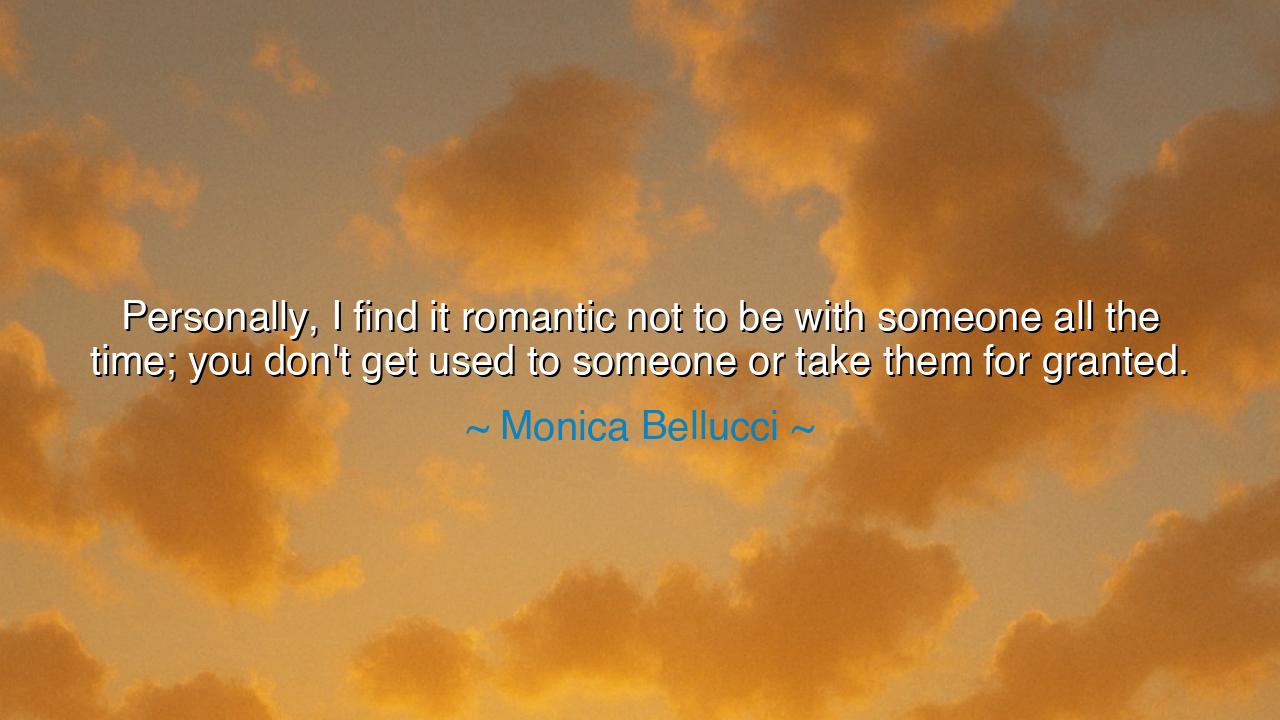
Personally, I find it romantic not to be with someone all the
Personally, I find it romantic not to be with someone all the time; you don't get used to someone or take them for granted.






"Personally, I find it romantic not to be with someone all the time; you don't get used to someone or take them for granted." – Monica Bellucci. In these words, Bellucci presents a refreshing and profound perspective on romance—one that challenges the conventional notion that constant proximity and presence are necessary for a relationship to be romantic. Instead, she suggests that space, distance, and time apart can elevate the quality of a relationship, preserving its mystery, desire, and depth. Romance, in this view, is not about endless togetherness but about maintaining the spark that makes the connection between two people unique and alive. The idea that absence can make love more potent is not a modern concept, but one rooted in ancient wisdom about human nature and desire.
In the ancient world, love and relationships were often seen as a complex balance between closeness and independence. Plato, in his Symposium, explores the idea that love is not just about physical closeness but about the yearning for spiritual connection and the pursuit of beauty. For Plato, love’s true essence lies not in constant union but in the desire to be separated from one's beloved, so that the longing and pursuit of union could be all the more intense. The act of seeking love, rather than merely possessing it, creates a dynamic tension that elevates the emotional experience. Bellucci’s words echo this ancient wisdom, highlighting that absence can heighten affection rather than diminish it.
The myth of Orpheus and Eurydice in Greek mythology serves as a poignant illustration of this idea. Orpheus, after losing his beloved Eurydice to death, is granted a chance to bring her back from the Underworld on the condition that he must not look at her until they reach the surface. His failure to resist the urge to gaze upon her before they have fully emerged reflects the difficulty of maintaining the mystique and anticipation that absence can bring. The tension between longing and union is a key element of the story, showing that the love between Orpheus and Eurydice is only fully realized through separation. Separation and longing, in this myth, are what make their love truly poignant and meaningful.
Consider the romantic relationship between Helen of Troy and Paris, which began in a moment of intense passion and longing. Though their union led to war and destruction, it also exemplifies the idea that the allure of love can be preserved by its rarity and the uncertainty that comes with it. Helen’s beauty was not just admired for her physical form, but for the mystique that surrounded her—the idea that her love was not easily obtained, and thus, it was endlessly coveted. Her love, though destructive in its outcome, became a symbol of how desire and distance can fuel romantic longing.
Bellucci’s view is also reflected in the philosophy of self that was prevalent in ancient cultures. The Stoics, for example, emphasized the importance of independence and self-sufficiency in relationships. The Stoic belief that one should not become overly dependent on another person for emotional fulfillment or validation aligns with Bellucci’s idea that constant presence can lead to complacency. The ability to appreciate someone from a distance, to preserve their mystery and value, is, in this sense, an act of wisdom. The Stoics argued that true love is built on mutual respect and freedom, not attachment and dependence. Bellucci echoes this sentiment, suggesting that relationships thrive when partners maintain their individuality and space, allowing love to remain fresh and alive.
The lesson Bellucci imparts is that romantic relationships should not be defined by the quantity of time spent together, but by the quality of the connection. In relationships where partners maintain their independence, they are free to grow both as individuals and as a couple, ensuring that the love they share remains dynamic and meaningful. Love, in this sense, is not about possession or constant proximity; it is about honoring the space between two people and allowing that space to fuel desire, intimacy, and growth.
In our own lives, we should embrace the idea that absence can be just as essential as presence in maintaining a strong and romantic connection. While togetherness is essential, it is the ability to miss each other, to have time to reflect and grow apart, that often deepens the bond between two people. Let us not take our relationships for granted by becoming complacent with constant proximity. Instead, let us cherish the moments apart, knowing that distance can increase our appreciation for those we love. By allowing ourselves and our partners the space to flourish individually, we create relationships that are not only sustainable but full of passion and meaning—relationships that grow deeper with each moment of absence and each reunion.






AAdministratorAdministrator
Welcome, honored guests. Please leave a comment, we will respond soon